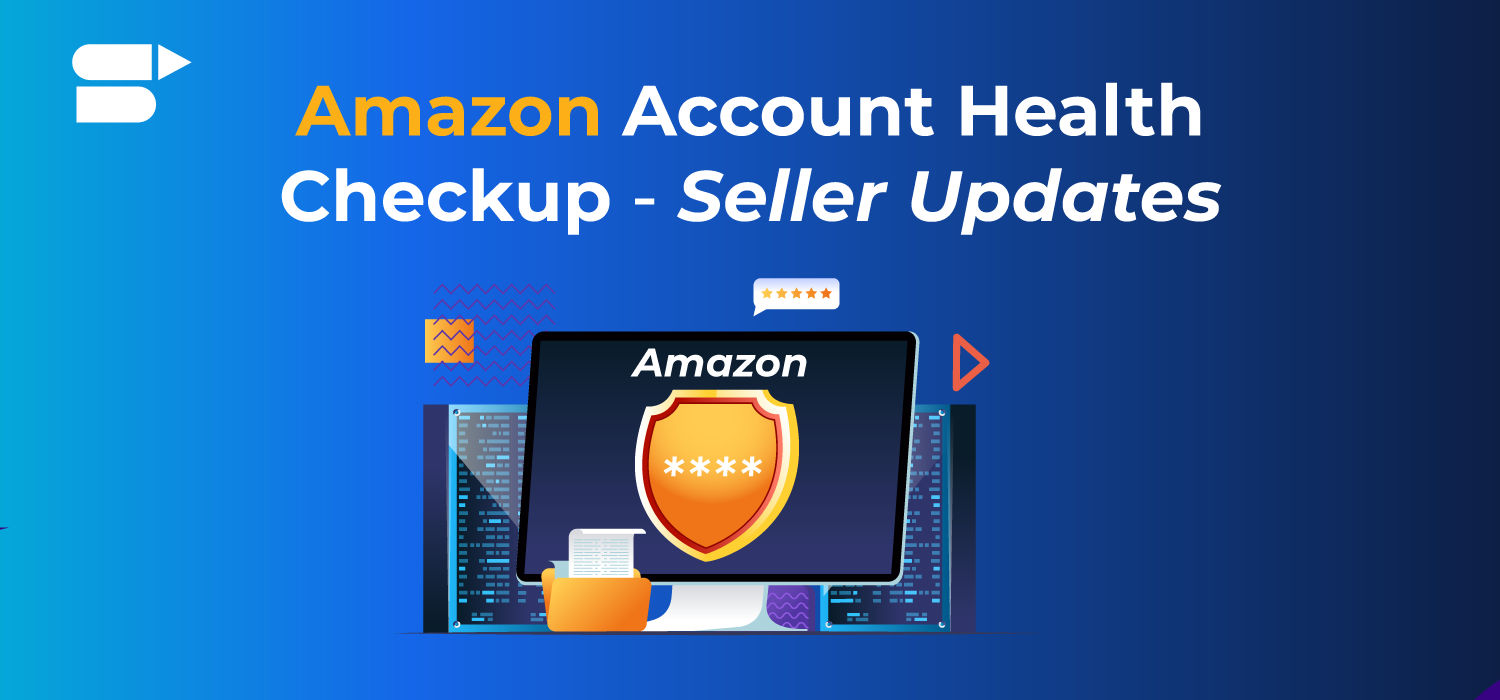Latest Updates on Amazon Account Health Checkup for improved Sales

Are you aware that you can manage your account health on Amazon? Ever tried doing the health checkup of your Amazon seller account?
With the frequent changes happening on seller central, safeguarding Amazon account health has become more important than ever!
Today, let’s break it all down to what it takes to manage your account health on Amazon.
How to find your Amazon Account Health metric?
To find your account health performance:
- Go to your seller central homepage.
- Under Performance, click Account health.

Amazon Account Health Rating – Introduction
Amazon Account Health Rating (AHR) is a feature that helps you monitor your Amazon account health in seller central. It is based on your adherence to Amazon’s selling policies. It considers certain factors like unresolved policy violations on your account in a given time.
Currently, this page is available for professional sellers.
It is evident that Amazon wants its sellers to maintain proper account health in accordance with standards. Amazon made a few changes to how you can monitor your account health, and the retail giant says that the policies will continue to be refined further.
According to Amazon:
- You need to maintain a ‘Good’ account health rating and address all the policy violations within a given time.
- If your AHR is ‘Critical’ or ‘At Risk’, your account may get deactivated.
In order to avoid such issues, you need to abide by Amazon’s policies, terms, and applicable guidelines. Along with that, you have six important account metrics you need to monitor, out of which three are extremely important.
The top three metrics and their benchmarks are as follows:
- Order defect rate < 1%
- (Pre-fulfillment) cancel rate < 2.5%
- Late dispatch rate < 4%
Your Seller Account Status
To ensure a stellar customer experience, Amazon reviews sellers’ account metrics and takes action if they do not comply with Amazon’s targets.
Your Amazon account status would be one of the following.
Active: You are allowed to sell on Amazon and you will get payments (funds) as per the normal schedule.
Under Review: You will be able to sell on Amazon. However, funds will be temporarily withheld until Amazon reviews your account.
Suspended: Your Amazon selling account is not allowed to sell. Besides, funds are temporarily withheld.
To read more about activating the Amazon seller suspended account check this guide.
Amazon Account Health Metrics
As mentioned above, Amazon sellers should focus on six key areas of improvement. Let’s get into the details.
Order Defect Rate
The AmazonOrder Defect Rate (ODR) measures your ability to provide a good customer experience. This includes one or more defect orders as a percentage of total orders within the past 60 days.
An order has a defect if it results in:
- Negative feedback
- Credit card chargeback
- A successful A-to-Z claim
According to Amazon’s policies, sellers should maintain an ODR under 1% to sell on Amazon. If their ODR is above 1%, it may result in account deactivation.
Cancellation Rate
For seller-fulfilled orders, the Cancellation Rate (CR) is the percentage of orders canceled by sellers. It is measured during a given 7-day period.
This metric includes all order cancellations initiated by the seller. If a customer cancels a pending order, your cancellation rate will not be impacted.
As per Amazon’s policy, sellers must maintain a CR under 2.5% to sell on Amazon. A cancellation rate above 2.5% may result in account deactivation.
Late Dispatch Rate
The Late Dispatch Rate (LDR) shows how many orders have their shipping confirmation posted after the expected ship date. The LDR is represented as a percentage of total orders over both a 10-day and 30-day period. This metric applies to seller-fulfilled orders.
Amazon sellers need to confirm the order shipment by the expected shipping date so the customers can see their shipped order’s status. Orders that are confirmed late (after the shipping date) might lead to an increase in claims, customer contacts, negative feedback, or result in poor customer experience.
As per Amazon’s policy, sellers need to maintain a late dispatch rate under 4% to sell on Amazon. Anything above this value may result in a warning from Amazon or account deactivation.
On-Time Delivery Rate
The On-Time Delivery Rate (OTDR) measures all shipments delivered by their estimated delivery date. It is calculated as a percentage of total tracked shipments.
This metric only applies to seller-fulfilled orders.
Amazon suggests sellers maintain an OTDR above 97% to provide a good customer experience. As of now, there is no penalty if sellers cannot meet this requirement.
Valid Tracking Rate
The Valid Tracking Rate (VTR) measures the percentage of total shipments that have a valid tracking number. This is measured over a given 30-day period. This metric only applies to seller-fulfilled orders.
Return Dissatisfaction Rate
The Return Dissatisfaction Rate (RDR) measures your customers’ satisfaction with their return experience. The return experience is considered to be negative if:
- You receive negative buyer feedback (Negative Return Feedback Rate),
- You don’t respond to a return request within 48 hours (Late Response Rate), or
- A return request is incorrectly denied (Invalid Rejection Rate).
Your RDR is measured as all negative return requests expressed as a percentage of total return requests. Amazon suggests that sellers maintain an RDR under 10%.
Invoice Defect Rate
In June 2020, Amazon introduced Invoice Defect Rate (IDR) as part of account health metrics. The main aim of this metric is to help third-party sellers track the invoicing experience it provides to Amazon Business customers. These customers need tax invoices or receipts for tax and accounting purposes.
Amazon IDR is the share of orders placed by Amazon business customers for which you have not provided a downloadable tax receipt (or invoice) within one business day after shipment confirmation. This needs to be in line with the Amazon Business invoicing policy.
If you want to learn about the other factors that can cause a Seller account ban, check out this detailed guide.
Final Thoughts
As you know, your Amazon account health checkup is vital to scale on the marketplace. Doing an account health checkup regularly keeps you informed about your listing issues and vulnerabilities. Alternatively, you can also set alerts with SellerApp and stay on top of your game.











Easton
May 29, 2021Well-written and informative blog.
Arishekar N
August 13, 2021Thank you for your feedback.
Hunter
July 6, 2021Thank you for the information. It helped a lot.
Arishekar N
August 13, 2021Very glad to know.
Nelson
March 8, 2022Excellent post. I was experiencing some of these issues as well.
Sorted now.
Arishekar N
June 8, 2022Happy to hear that. Thanks for the feedback.